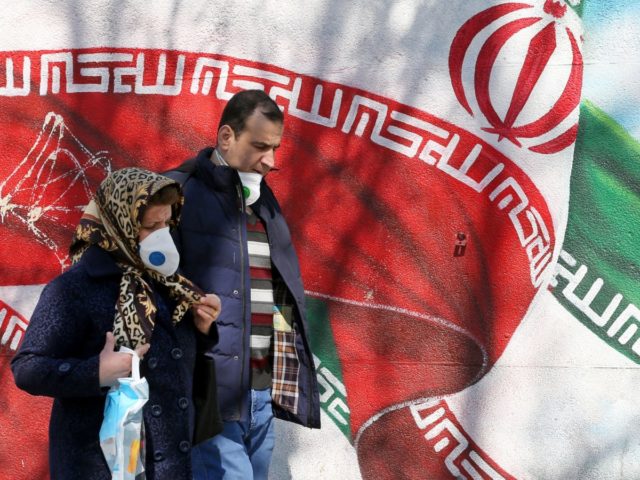Brigadier General Gholam Reza Jalali, an Iranian officer in charge of the country’s Civil Defense Organization, said in an interview on Tuesday that the Chinese coronavirus may be a “biological attack” against Iran and China, not a naturally occurring disease.
The mystery behind the origin of the Chinese coronavirus – first identified in the central metropolis of Wuhan, home to one of China’s most advanced biological laboratories – has birthed many theories on how the highly contagious outbreak began. Chinese authorities initially concluded that the virus originated in wild animal meat and jumped to humans at a wild meat market in Wuhan, but multiple scientific studies have dismissed that possibility, leaving no widely agreed-upon explanation.
Chinese officials themselves have speculated that the virus originated outside of the country, despite no evidence of it having infected a human being outside of Wuhan before December 2019.
Jalali did not name a country allegedly responsible for the “biological attack” of unleashing the coronavirus on China and Iran, but he appeared to imply that the United States or another Western country executed the attack, according to the Iranian Fars News Agency.
“A study of the consequences of the virus in terms of tolls or the extent of the epidemic and the type of media propaganda over this issue that is aimed at increasing fear and panic among people strengthens the speculations that a biological attack has been launched against China and Iran with economic goals,” Jalali told Fars, a government outlet. The official went on to accuse a “hostile state,” without specifying, of creating the coronavirus.
Jalali ceded that he would need “laboratorial investigations and comparing the genome of the primary virus and the new genomes” to confirm the theory.
Iran is struggling with thousands of coronavirus cases and potentially thousands of deaths, though as of Wednesday the Islamic regime claims it has documented only 92 deaths. The official tally notes 2,922 cases of coronavirus in Iran, most originating in the city of Qom, a popular tourist location due to its importance in Shiite Islam.
These numbers are significantly lower than what outside reports and claims from dissident groups assert. The People’s Mojahedin Organization of Iran (PMOI/MEK), one of Iran’s largest dissident organizations, said in a press release Tuesday that it had evidence that as many as 1,200 people had died in Iran since the first case of Chinese coronavirus was documented and the deaths are occurring nationwide, not just in Qom.
“The rapid virus outbreak in Iran and its transmission to other countries around the world is the result of weeks-long cover-ups, lies, and misleading information to the public.” PMOI asserted in its statement Tuesday, adding that multiple Iranian lawmakers are speaking out against the Supreme Leader Ayatollah Ali Khamenei and disputing official government statistics. Iran’s parliament is particularly threatened by the coronavirus outbreak, as Tehran has confirmed 23 lawmakers as coronavirus carriers. They join the nation’s vice president and the head of coronavirus response as senior government officials infected with the virus.
PMOI also claimed on Wednesday that the virus had begun infecting members of the Islamic Revolutionary Guard Corps (IRGC), a U.S.-designated terrorist organization. At least one IRGC leader, ground forces counterintelligence head Ramezan Pourghassem, allegedly died of coronavirus disease.
The group also published videos online allegedly of diseased people collapsing on the streets of Tehran, suggesting the outbreak is much more widespread than the government is willing to admit. The videos resemble those smuggled out of Wuhan, China, during the early days of the outbreak there in January, which Beijing refused to confirm as legitimate.
The Chinese coronavirus, like similar pathogens, causes flu-like symptoms including difficulty breathing, fever, and body aches. Scientists have evidence that it is highly contagious through moisture particles in the air and infects the lungs. In severe cases, patients experience difficulty breathing that evolves into pneumonia, sometimes with fatal consequences. Most fatal cases appear to be occurring among seniors or individuals with other chronic conditions.
Similarly, Iranian media have taken to attacking PMOI for publishing the information it claims to have acquired from sources inside the country.
“These days, thousands of tweets and fake information are produced by [PMOI] with the common notion that foreign medical items are contaminated and that (Iran’s) people should refrain from using them,” Iranian Ambassador to London Hamid Baeidinejad accused in a post on Tuesday. It is not clear what “fake information” he was referring to, as the Tasnim News Agency, which ran his comments, did not offer any examples.
Amid growing concerns that the outbreak in Iran is out of control, Ayatollah Khamenei issued remarks Tuesday insisting that the “jihad” against coronavirus is going well and that the outbreak “is not such a big tragedy.”
“I don’t want to say it’s unimportant, but let’s not exaggerate it either. The Coronavirus will affect the country briefly & leave. But the experience it brings, and the actions of the people & the govt sectors, are like a public exercise that will remain as an achievement,” Khamenei said.
Follow Frances Martel on Facebook and Twitter.

COMMENTS
Please let us know if you're having issues with commenting.